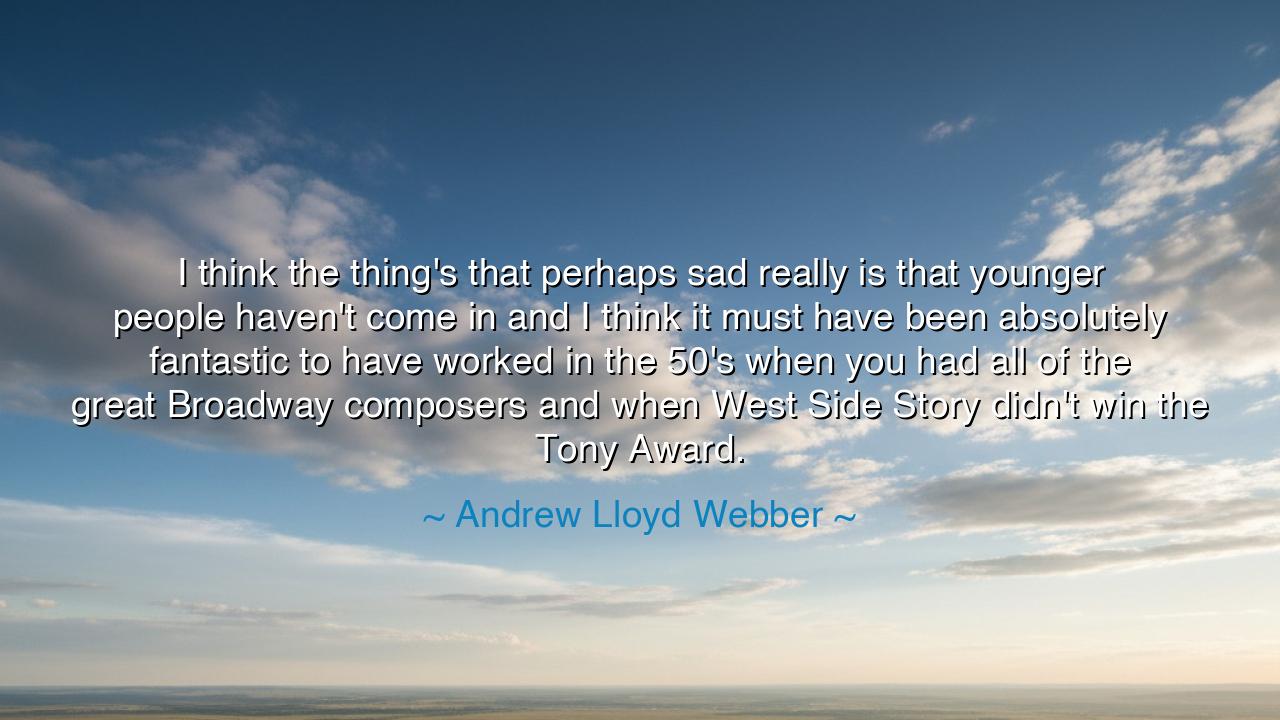
I think the thing's that perhaps sad really is that younger
I think the thing's that perhaps sad really is that younger people haven't come in and I think it must have been absolutely fantastic to have worked in the 50's when you had all of the great Broadway composers and when West Side Story didn't win the Tony Award.






The words of Andrew Lloyd Webber, a master of stage and song, resound with both admiration and lament. “Younger people haven’t come in… it must have been absolutely fantastic to have worked in the 50’s when you had all of the great Broadway composers and when West Side Story didn’t win the Tony Award.” Here he mourns the fading of an age of brilliance, while also marveling at its wonders. His tone is both wistful and reverent, for he sees that the torch of creation, once held high by giants, now flickers with fewer new hands to carry it forward.
The origin of this thought lies in Webber’s deep connection to the traditions of musical theater. As a composer whose own works—The Phantom of the Opera, Evita, Cats—have become cornerstones of modern Broadway, he stands as both heir and witness to the lineage of composers who shaped the stage before him. When he recalls the 1950s, he is not merely speaking of nostalgia, but of a golden era when the likes of Rodgers and Hammerstein, Leonard Bernstein, and Cole Porter defined the art form with daring and innovation. The irony that West Side Story, one of the greatest musicals ever conceived, did not claim the Tony, only magnifies his awe at the abundance of genius in that time.
In his lament about the absence of younger voices, Webber echoes an ancient concern: that the vigor of the present cannot always match the brilliance of the past. The Greeks once spoke of the Age of Heroes, when men like Achilles and Hector strode across the earth, larger than life. Later generations, though noble in their own right, often looked back with longing, convinced they walked in the shadows of greater forebears. So too does Webber, gazing upon the dazzling constellation of mid-century Broadway, wonder if such light will ever blaze again.
History offers us a parallel in the story of the Florentine Renaissance. In the time of Michelangelo, Leonardo da Vinci, and Raphael, the arts flourished with divine intensity. Yet within a century, many lamented that the golden fire had cooled. They looked back to the “great age,” forgetting that every age has its own brilliance, waiting for new voices to emerge. Webber’s words remind us that this tension—the yearning for the past and the hope for the future—is the eternal rhythm of artistic creation.
Yet in his reflection lies not only sorrow but also inspiration. To remember that West Side Story—a masterpiece of music, choreography, and story—once failed to win the highest award should teach us that greatness is not always recognized in its own time. The artist must therefore labor not for immediate glory, but for truth, for beauty, for the work itself. Recognition may come or not, but the art endures. Webber, in recalling this, offers a hidden encouragement to the next generation: even if the world does not yet see your worth, create with courage, for time itself will reveal your light.
The lesson for us, then, is twofold. First, let us honor the past, studying the works of those who came before us, learning from their mastery, and drawing inspiration from their daring. But second, let us not despair for the future. Every age awaits its voices. Every field, whether art, science, or leadership, needs those who will rise, even if the giants of old seem too towering to surpass. The torch of creation is never extinguished; it simply waits for hands bold enough to lift it.
Practically, this means the young must not be intimidated by the greatness of history. Instead, they must enter the arena, offering their own voices, their own visions, their own courage. And those who are older, like Webber, must continue not only to remember the golden age, but also to encourage the next one, nurturing talent wherever it arises. In this way, the memory of Broadway’s past becomes not a grave, but a seedbed for the future.
Thus, Andrew Lloyd Webber’s lament becomes a call to action. Celebrate the past, but do not be trapped by it. For as the ancients remind us, the gods always raise new heroes, and as history teaches, every generation has the power to create its own golden age—if only it dares to step forward.






AAdministratorAdministrator
Welcome, honored guests. Please leave a comment, we will respond soon